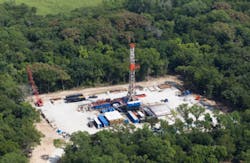Countries around the world consider fracking after US success
Tempted by the U.S. shale gas revolution that could soon see the country top the charts in natural gas production, a number of countries around the world are considering introducing the same technology, in the hope of achieving similar results.
In Europe, Poland is already planning to start shale gas production, using the same technology used in the U.S. — hydraulic fracturing, known as fracking — in an attempt to become less dependent on energy imports from Russia. The Polish State Geological Institute has calculated that shale gas deposits mean the country could be exploiting the resources for at least 25 years. More than 20 companies have been given over 100 exploration concessions, with operations scheduled to launch in 2014, according to Poland's treasury minister, quoted by the Washington Times.
RELATED: Marcellus shale fracking threatens region's wastewater systems, researchers find
The UK is also eyeing the possibilities provided by fracking, following its lifting of a moratorium on hydraulic fracturing, imposed over suspicions that the technology could cause earthquakes. Still, the method is largely shrouded in doubts, as countries like France and Bulgaria have already banned fracking. Experts have been warning that strong environmental opposition could harm the development of oil and shale gas production in Europe, which would lead to major economic opportunities being missed. The fact that fracking has already been banned in some European countries might cause investors to abandon the area and focus their attention in other regions, including North America, China and the Middle East, said Mohamed al-Mady, chief executive of Saudi petrochemical giant Sabic, quoted by the Financial Times. In the meantime, the European Union has ordered extensive research into how safe fracking is, with results expected in mid-2014.
Still, the practice is drawing the attention of governments worldwide. Outside Europe, a number of countries have plans to introduce fracking. One of these countries is Argentina: already the biggest producer of natural gas in South America, Argentina is considering applying the method on a large scale to fully exploit its supply.
RELATED: EPA issues progress report on fracking
Recently, information from the independent Beijing-based publication Caixin revealed the existence of a secret Chinese white paper, stating that the country is preparing a "huge fracking industry," with plans modeled on the U.S. shale gas sector. Elsewhere in the world things are not very different. FTS International Ltd, a Texas-headquartered fracking equipment company, has announced joint ventures with partners in Saudi Arabia and Brazil. The former has its own reasons to examine the U.S. shale gas practices closely, since the boom of oil production in the U.S. threatens to overturn the Middle Eastern country as the world's largest oil producer by 2020.
Commenting on the fracking trend, Daniel Simmons, energy scholar at the Institute for Energy Research, said that the whole world has been watching closely to see how things would turn out for the U.S. and its energy production. Naturally, after seeing the remarkable effect that unconventional methods of production have had there, other countries have started to wonder if they can achieve similar success.
